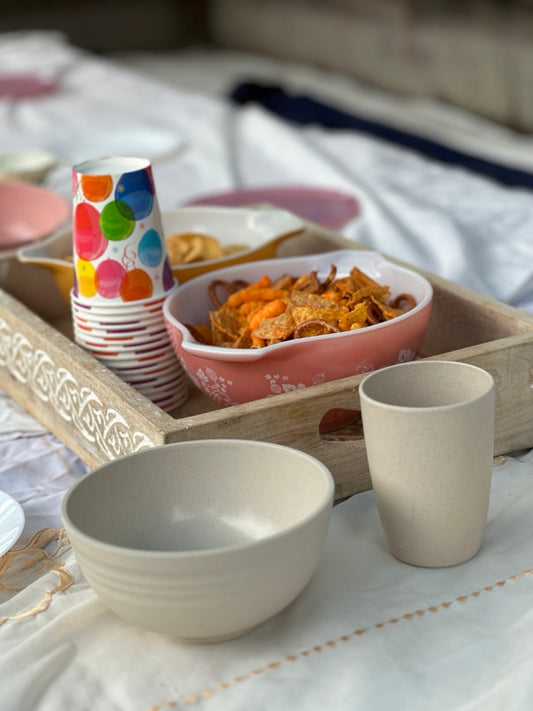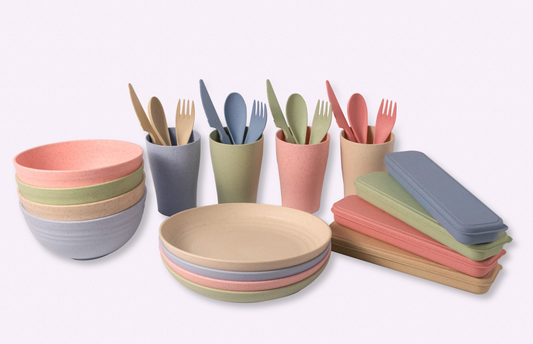Caution Regarding Bamboo Tableware: Weighing the Benefits and Risks
Bamboo tableware has gained popularity in recent years, largely due to its natural appeal and perceived eco-friendliness. The allure of using a renewable resource for plates, cups, and utensils is strong, especially for those looking to reduce their carbon footprint. However, while there are undeniable benefits to bamboo tableware, there are also significant drawbacks and risks that consumers should be aware of before making the switch.The Hidden Dangers of Bamboo Tableware
One of the main issues with bamboo tableware is the potential health risk associated with products that combine bamboo with melamine. Melamine is a type of plastic often used to bind bamboo fibers and create a durable product. However, when heated or exposed to acidic foods, melamine can leach into food and drinks, posing a health risk if ingested in large quantities. Studies have shown that melamine exposure can lead to kidney stones and other renal issues in humans and animals. Therefore, it's crucial to check the composition of bamboo tableware and avoid products that contain melamine, especially for children's use or for serving hot foods and beverages.Another concern with bamboo tableware is the odor it can produce. Bamboo itself has a natural scent, which some people find unpleasant when it comes into contact with food. This odor can be particularly strong when the tableware is new or if it hasn't been treated properly. Over time, the smell can diminish, but it may never fully disappear, affecting the dining experience.
Environmental Concerns with Single-Use Bamboo Tableware
While bamboo is a renewable resource, the environmental benefits are undermined when it comes to single-use bamboo tableware. The production process for disposable bamboo products still involves significant resource consumption, including water, energy, and chemicals for processing and treating the bamboo. Additionally, single-use items contribute to waste, much like their plastic counterparts, and can take a considerable amount of time to decompose if not properly managed. This defeats the purpose of choosing bamboo over other materials and adds to the growing problem of waste management.A Greener Alternative: Wheat Straw Plastic Tableware
In comparison, wheat straw plastic tableware offers a more environmentally friendly option. Wheat straw, a byproduct of wheat production, is often considered agricultural waste. By repurposing this material into tableware, manufacturers not only reduce waste but also create a sustainable product that is biodegradable and compostable.Wheat straw plastic is lightweight, durable, and can withstand high temperatures, making it suitable for both hot and cold foods. Unlike bamboo tableware with melamine, wheat straw plastic does not pose the same health risks. Additionally, wheat straw tableware tends to be odorless, enhancing the dining experience.
The environmental footprint of wheat straw plastic is considerably lower than that of single-use bamboo products. It makes use of an existing byproduct, minimizing the need for new resources and reducing overall waste. When it reaches the end of its life cycle, wheat straw plastic can break down naturally, contributing to a circular economy.
Making an Informed Choice
Choosing the right tableware is about balancing benefits with potential risks. While bamboo tableware can offer a natural, renewable option, it's important to be aware of the potential health risks and environmental impact associated with certain products. On the other hand, wheat straw plastic tableware provides a compelling alternative that addresses many of these concerns, offering a safer, more sustainable option for eco-conscious consumers.Ultimately, being informed about the materials and production processes behind your tableware can help you make choices that are not only good for your health but also for the environment. By considering all factors, from potential health risks to environmental impact, you can find tableware that aligns with your values and meets your needs.





